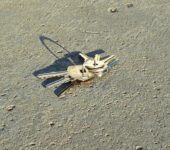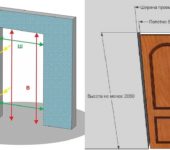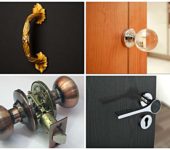Magnetic locks and latches for interior doors - modern and practical!
Doors in the house are a very important part of the decor. It is not only a functional element, but also a decoration that gives the interior completeness and individuality. But the doors must be closed. If you are looking for beautiful, practical and reliable locks, take a look at the novelty - magnetic locks and latches.
The content of the article
Door magnetic latches: types, advantages and disadvantages
We are talking about magnetic door latches for interior doors, and not about locks for front doors. This is important, since they are arranged in different ways. So, magnetic latches work by the magnetic field that a permanent magnet generates. As you know, metal is attracted to magnets. This is how the magnetic latch works: there is a magnet and a metal plate. They are fixed on the jamb and at the end of the door leaf. When the doors are closed, they come closer, they attract. Thus, magnetic latches work, but they are different - active and passive.
Passive magnetic door strikes
Everyone knows furniture magnets for fixing doors - these are passive magnetic latches. In the simplest form - for furniture - they are one or two magnet plates in a small plastic case. This body is attached to the furniture in the right place. The second part - a metal plate - is fixed on the doors. We close the doors, the magnet attracts the plate and holds it. Due to this, they do not open.
This type of furniture magnets is familiar to everyone, and the principle of operation is clear. There is a variant of magnetic latches for compartment doors. They are placed in closets. In this case, the handles are made cut-in so that they do not interfere with their movement.
There are the same passive magnetic latches and larger sizes. They can already be used for interior, balcony doors. The same, but in a different design, are sometimes placed on the entrance, but not as a lock, but rather as a door closer. This is especially true for glass doors, for which conventional closers install problematic.
If we talk about the advantages of passive magnetic latches, they are obvious:
- Simple installation. Both parts are simply screwed to the jamb and door leaf opposite each other. This completes the installation. It is very rarely necessary to deepen them.
- Very low noise level. Only a click is heard when the sash hits the door frame. But this sound is much quieter than the sound from a spring loaded deadbolt.
- There is no mechanics, only the interaction of a magnet and a metal.
- Low price. Furniture options are generally a penny, but for balconies and interroom options - the price is from $ 20 and above.
Passive magnetic latches are an excellent solution for plastic and metal-plastic balcony doors. We all are faced with the need to go out onto a balcony or loggia. In this case, the handle of the locking mechanism is installed only indoors. Outside, if they put it, then only an ordinary handle, by which the sash can be pulled. Usually you can only cover it up, and in winter it pulls desperately from under the door with cold. This is where the magnetic latch comes in. It attracts and holds the door closed.
Active with bolt
For interior doors, the passive version of the magnetic latch is not very convenient. Nevertheless, we are accustomed to the door leaf being fixed in the locked state. And the fixation by attraction is not very reliable.Even a draft can open the doors. Therefore, they came up with another type of magnetic latches - with a deadbolt.
When a magnetic lock is placed on an interior door, a magnet is inserted into the jamb, an overlay with a crossbar (pull-out lock, tongue) is cut into the sash. When the sash is open, the catch is retracted into the door leaf. The doors close, the catch approaches the magnet. Under the action of the force of the magnet, the bolt jumps out, falls into the groove, which is attracted by the magnet and remains there. This is how the door leaf is fixed in the closed state.
When the magnetic lock needs to be opened, press the handle, pushing the bolt forcibly, open the doors. Since the magnet does not attract the bolt, it stays pulled in after the handle is released. This is how a magnetic latch with a deadbolt works.
If we talk about active type latches, there are fewer advantages. Installation is standard. The parts cut into the box and sash. The cost of a normal magnetic lock is rather big. Of the real advantages, it remains:
- Quieter operation. They are far from silent, as is often said in advertisements, but quieter than spring bolts. True, if the crossbar is made of plastic, then such a spring latch is practically silent.
- Long service life. The exact figure depends on the manufacturer, but since there are no rubbing parts, there is not much wear either. Special magnetic plastic, reinforced with glass cloth, withstands up to 200,000 operating cycles (open / close) without changing the performance properties.
And as usual, how well a magnetic latch will work depends on its quality. Don't buy the cheapest. Some may work well, but there is no guarantee that you will get a normal one.
Types of magnetic locks
Magnetic latches can be different in design:
- Only with a handle.
- Latch with handle and lock.
- With pen and magnetic card.
The option is simple with a handle - for those cases when there is no need to lock the room. The handle is only needed for opening - to move the bolt away from the magnet. It is pulled for it when the door leaf is opened or closed. It can be round or oblong, regular and not quite in shape.
For those cases when the doors need to be locked, there are models with a lock and a magnetic card. The catch is a stop, which by turning a small handle wedges the bolt. Until the latch is moved to its original position, no one can open the doors.
The magnetic latch for the card door has a more sophisticated design. When the doors are closed, the deadbolt is in the counterpart. In this case, the outer handle is blocked by a special device. The blocking can only be unlocked with a specially programmed card. The inner handle works as usual. Such locks are installed in hotels. They are unlikely to be required for a house or apartment.
Magnetic locks AGB (Italy) - quality at an affordable price
Practicing craftsmen have a lot of complaints about Chinese-made magnetic locks - often the magnetic latch simply does not work. In order not to get into a mess, you should not skimp on fittings. The products of the Italian company AGB enjoy a good reputation, as evidenced by numerous positive reviews.
For marketing purposes, the term "smart magnetic lock" has been coined.
A smart magnetic lock that overcomes the toughest climates. Designed with innovative materials to ensure that the lock works even in extreme weather conditions (humidity, dust, chemicals).

Polaris 2XT is a smart magnetic lock from AGB. The face plate is made of stainless steel. On request, the lock is also available with a rectangular face plate
Polaris 2XT features quiet closing and precise mechanical connections that give you the pleasant feel of smooth grip and key turning.

The Easy-Fix XT adjustable magnetic striker facilitates installation and the clamping system secures the insert in the strip


















